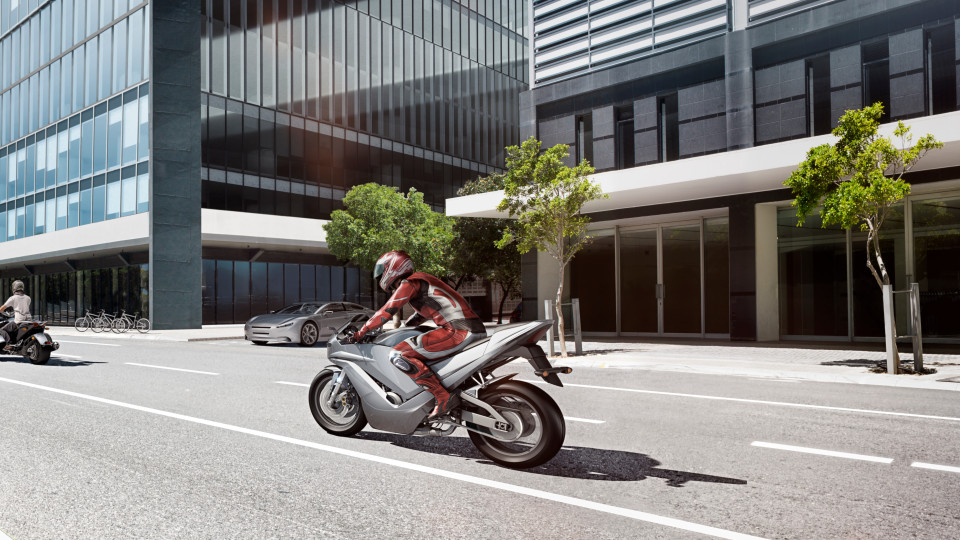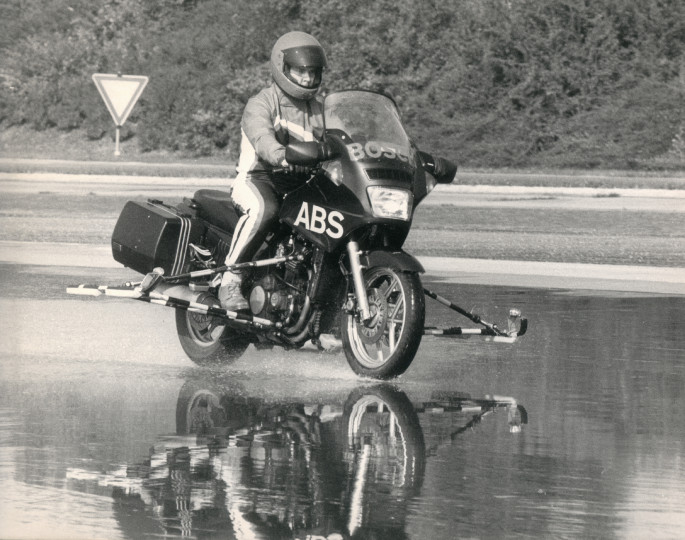Thanks to decades of development, a number of key technologies now make motorcycling much safer, while the rise of electric drive systems in the two-wheeler market also seems unstoppable.
Bosch’s motorcycle ABS technology turns 30 years old and keeps evolving
This year marks the 30th anniversary of Bosch launching its first series-production ABS system for motorcycles in 1995 – a major milestone in the advancement of rider safety. Following its success in cars, the anti-lock braking system began its conquest of the motorcycle world, debuting in series production on Kawasaki’s iconic GPZ1100 ABS model. Since then, Bosch has been continuously developing safety technologies for two-wheelers.
ABS is not only useful, it is also mandatory in many countries
Today, the importance of ABS is reflected not only in increasingly advanced Bosch technologies but also in international regulations. In 2016, the European Union made ABS mandatory on motorcycles over 125 cc, and starting in 2027, Singapore will be the first country in the world to require ABS on all new motorcycles – including those under 125 cc. These steps also highlight the growing importance of rider protection and safety worldwide. In 2007, Bosch established its own center of competence, specialized in two-wheeler safety technology, in Japan, and then introduced a series of increasingly advanced ABS systems for small, medium, and high-performance motorcycles.
“Bosch’s mission has been clear for 30 years: to make riding safer through innovation, precision, and intelligent technologies,” said Geoff Liersch, head of Two-Wheeler & Powersports at Bosch.
Bosch research: motorcycle accidents could be reduced by 30 percent
One of Bosch’s most sophisticated motorcycle safety solutions is Motorcycle Stability Control (MSC). This system provides crucial protection in situations where motorcyclists are particularly vulnerable, such as when cornering or performing dynamic maneuvers. The MSC evaluates vehicle dynamics up to 100 times per second to regulate braking and acceleration, even when the motorcycle is leaning into a corner. Beyond cornering functions, Bosch continues to develop further MSC capabilities, including rear-wheel lift-up control, vehicle hold control for use on slopes, and rear-wheel slide control. According to a Bosch study, the combined use of ABS and MSC systems could prevent or mitigate more than 30 percent of motorcycle accidents involving personal injury.
Digital passport for batteries, battery twins in the cloud
A European Union regulation coming into force in February 2027 will make the digital passport mandatory for the batteries of electric vehicles, for which Bosch offers a new technological solution. The Digital Battery Passport contains, among other things, the battery’s manufacturing data, data collected during its life cycle, and information on recycling. This system provides transparent information about the battery and its condition to all parties involved.
Another innovation is Bosch’s cloud-based battery service, Battery in the Cloud, designed to help motorcycle manufacturers continuously monitor, predict, and optimize the condition of their batteries. This innovative system creates a digital battery twin in the cloud, which reflects the real battery’s condition using sophisticated data analysis and AI-based models. As a result, it’s possible to detect stress factors early on, significantly reducing failures and extending battery life.
Mónika Hack
+36 70 510 5516
Bosch has been present in Hungary since 1898 with its products. After its re-establishment as a regional trading company in 1991, Bosch has grown into one of Hungary’s largest foreign industrial employers with currently nine subsidiaries. In fiscal 2024 it had total net sales of 2058 billion forints and consolidated sales to third parties on the Hungarian market of 313 billion forints. The Bosch Group in Hungary employs more than 17,400 associates (as of December 31, 2024). In addition to its manufacturing, commercial and development business, Bosch has a network of sales and service operations that covers the entire country.
The Bosch Group is a leading global supplier of technology and services. It employs roughly 418,000 associates worldwide (as of December 31, 2024). The company generated sales of 90.3 billion euros in 2024. Its operations are divided into four business sectors: Mobility, Industrial Technology, Consumer Goods, and Energy and Building Technology. With its business activities, the company aims to use technology to help shape universal trends such as automation, electrification, digitalization, connectivity, and an orientation to sustainability. In this context, Bosch’s broad diversification across regions and industries strengthens its innovativeness and robustness. Bosch uses its proven expertise in sensor technology, software, and services to offer customers cross-domain solutions from a single source. It also applies its expertise in connectivity and artificial intelligence in order to develop and manufacture user-friendly, sustainable products. With technology that is “Invented for life,” Bosch wants to help improve quality of life and conserve natural resources. The Bosch Group comprises Robert Bosch GmbH and its roughly 490 subsidiary and regional companies in over 60 countries. Including sales and service partners, Bosch’s global manufacturing, engineering, and sales network covers nearly every country in the world. Bosch’s innovative strength is key to the company’s further development. At 136 locations across the globe, Bosch employs some 87,000 associates in research and development
Additional information is available online at www.bosch.hu, iot.boschblog.hu, www.bosch.com, www.iot.bosch.com, www.bosch-press.com, www.twitter.com/BoschPresse







